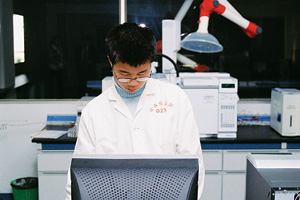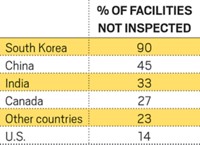Advertisement
Grab your lab coat. Let's get started
Welcome!
Welcome!
Create an account below to get 6 C&EN articles per month, receive newsletters and more - all free.
It seems this is your first time logging in online. Please enter the following information to continue.
As an ACS member you automatically get access to this site. All we need is few more details to create your reading experience.
Not you? Sign in with a different account.
Not you? Sign in with a different account.
ERROR 1
ERROR 1
ERROR 2
ERROR 2
ERROR 2
ERROR 2
ERROR 2
Password and Confirm password must match.
If you have an ACS member number, please enter it here so we can link this account to your membership. (optional)
ERROR 2
ACS values your privacy. By submitting your information, you are gaining access to C&EN and subscribing to our weekly newsletter. We use the information you provide to make your reading experience better, and we will never sell your data to third party members.
Business
China Reforms Drug Oversight
by Jean-François Tremblay
September 10, 2007
| A version of this story appeared in
Volume 85, Issue 37

Plagued by a series of scandals over the past year, China's State Food & Drug Administration (SFDA) is reforming its procedures for approving new drugs and strengthening its oversight of pharmaceutical plants. Although it's early in the process, Chinese drug executives are bullish on the reform plan.
"China's pharmaceutical industry will put more emphasis on product quality, R&D, and fair competition," says Li Xiao Dong, deputy director of the technical operations department of Shanghai Pharmaceutical, one of China's leading drug manufacturers. The changes will reduce corruption among government officials, he predicts.
Throughout this year, Chinese authorities have been sentencing former senior SFDA officials found guilty of accepting bribes for allowing substandard drugs to be sold on the Chinese market. In one case last year, an improperly approved drug killed 13 patients in a hospital in the southern city of Guangzhou. Paying the ultimate price for this and other shortcomings of the agency, the former head of SFDA, Zheng Xiaoyu, was put to death in July (C&EN, July 16, page 9).
Corruption at SFDA has shaken confidence among the Chinese in their country's own drugs and among foreign buyers of Chinese pharmaceutical chemicals. Joseph G. Acker, president of the Synthetic Organic Chemical Manufacturers Association, a U.S. trade group representing custom chemical makers, wrote in his blog last month that "the recent questions concerning the quality and safety of products manufactured in China are alarming and overdue." He added that some U.S. buyers of pharmaceutical ingredients have been switching back to domestic suppliers.
SFDA is tackling public concerns head on. According to an article published last month in Pharmaceutical Reference News, the monthly magazine of the Shanghai Pharmaceutical Producers Association, SFDA will begin conducting audits to make sure that the drugs sold to patients are the same ones that it approved.
In addition, the agency will keep track of whether manufacturers use the appropriate raw materials. In the Guangzhou case, the manufacturer of the substandard medicine had been erroneously using diethylene glycol instead of propylene glycol as an excipient.
According to Shanghai Pharmaceutical's Li, SFDA will carry out these measures through its regional branches, which will deploy inspectors to pharmaceutical plants where they will monitor incoming raw materials and other plant operations.
Li projects that this system will be effective, even though responsibilities for enforcing national rules will be delegated to regional offices that are known for their susceptibility to bribes or local political pressure. For example, he expects the inspectors will be rotated frequently to avoid familiarity with plant staff. "In the U.S., FDA is also decentralized," he says.
Leon Chen, a principal at Shanghai-based BioVeda China, expects that at least a fifth, and perhaps as many as half, of the thousands of pharmaceutical plants in China will be decertified as a result of SFDA's more stringent oversight procedures. BioVeda China is a private equity firm that invests primarily in Chinese life sciences companies.
While it strengthens its oversight of manufacturing, SFDA is also reforming its new drug approval procedures. In the past, according to Chen, Chinese companies could submit new formulations or dosages of existing drugs as though they were entirely new drugs. A drug in capsule form that became newly available in tablet form, for example, could be marketed as a completely new product. Not only did this practice confuse Chinese patients, it also used up a significant portion of SFDA's resources.
SFDA will give priority to approving new classes of drugs and stop wasting its time reapproving products already on the market. Shanghai Pharmaceutical's Li says the new procedures will emphasize openness and are modeled after those of the agency's U.S. counterpart. The new procedures, he adds, will sharply reduce the possibility that officials could fall prey to corruption.
As in the inspection process, much of the responsibility for approving new drugs will be decentralized to the provincial level, where authorities will be required to make public all documents used in coming to their decisions. "The decision of whether to approve the drug will be based on scientific data," Li says, adding that it will not be possible anymore to obtain approval on the basis of a fake dossier.
Other than improving drug safety and approvals, one of SFDA's major goals is to encourage innovation in China's pharmaceutical sector. The agency believes that its past policy failures and mismanagement are largely to blame for China's lack of success in inventing new drugs up to now.
Chen, whose company has invested tens of millions of dollars in Chinese drug companies, is in favor of the changes. "It's good for the companies we invest in," he says. "It's no longer a corruption game to get a product approved."




Join the conversation
Contact the reporter
Submit a Letter to the Editor for publication
Engage with us on Twitter